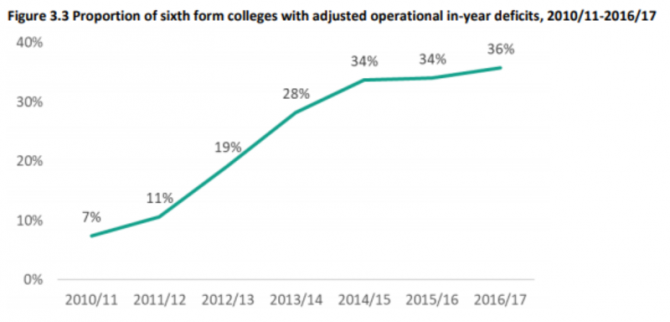The proportion of sixth form colleges with in-year deficits has soared fivefold over a six-year period due to crippling 16 to 19 funding cuts, according to new research from an influential think tank.
In 2016/17, 36 per cent of sixth form colleges had “adjusted operational in-year deficits”; whereas in 2010/11 it was just seven per cent.
Over the same time period, the proportion of FE colleges with in-year deficits doubled from 20 per cent to 40 per cent.
This is not sustainable in the long term
According to the report from the Education Policy Institute (EPI), the rising deficits suggest some providers “have used their balance sheet to cushion falls in funding to avoid more serious declines in provision or quality”.
“This is not sustainable in the long term,” it adds. “If providers’ financial health continues to deteriorate as a result of falls in funding, then provision and quality could be further compromised, with potentially more severe effects on students and providers.”
The report also found that guided learner hours for 16 to 19-year-olds fell by nine per cent between 2012/13 and 2016/17, from 730 hours to 665 hours per student.
It explained that the reason for the rising deficits and reduced learning hours was largely because 16 to 19 funding decreased “faster than in other phases of education between 2010/11 and 2018/19”.
“Funding per 16 to 19 student fell by 16 per cent in real terms compared to 10 per cent in the whole school sector,” the report said.
The FE sector has already taken notice of this decline, and several unions and associations have clubbed together to form the Love Our Colleges campaign.
Additionally, the Sixth Form Colleges Association is leading the Raise the Rate campaign, which is lobbying for an increase to the base rate for all 16 to 18-year-old students from £4,000 per student to £4,760.
The Association of Colleges has meanwhile said the rate should be upped to £5,000, which it says is needed to avoid a T-levels crisis.
A third area that has seen a hit in recent years is the wages of FE college teachers: these fell by an average of eight per cent in real terms between 2010/11 and 2016/17, from £33,600 to £31,000, according to the EPI report.
Teachers at FE colleges are now paid 17 per cent less than those in secondary schools, who are paid, on average, £36,700.
The fall was less pronounced at sixth form colleges, where the average teaching wage decreased from £39,900 to £39,000.
FE teachers’ wages is a live issue, as staff at a number of colleges continue to go on strike over pay.
In March, members of the University and College Union voted for their third wave of strikes this academic year, following similar action in November and January.

EPI chair and former education minister David Laws said the report shows sixth form and college funding has been the “big loser” when compared to other phases of education.
Rod Bristow of Pearson, which commissioned the report, said the report “made clear” FE institutions have been “struggling against the tide of decreasing funding levels by narrowing choices”.
With the Spending Review on the horizon, the deputy chief executive of the Sixth Form Colleges Association, James Kewin, said the report provides further evidence cuts have been “bad for students, bad for teachers and bad for the financial health of institutions,” and its main audience should be Treasury ministers, not the DfE.
David Hughes, chief executive of the Association of Colleges, added: “Report after report and expert after expert have highlighted the impact of the decade of cuts that England’s colleges have had to endure.
“The message is clear; the Chancellor cannot go on ignoring the overwhelming independent evidence consistently presented to him. If he is serious about supporting our economy and our communities, he has to get serious about investing in our colleges.”
A Department for Education spokesperson said: “We recognise that 16 to 19 funding rates are challenging for all providers at the moment and are looking carefully at this in the run-up to the next Spending Review.”









Your thoughts